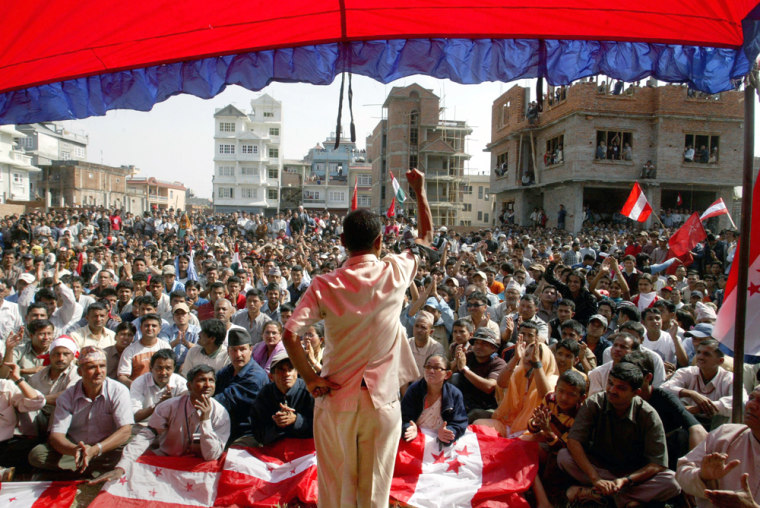Nepal’s King Gyanendra broke his silence Friday after more than a week of pro-democracy protests in which four people have died, calling for dialogue with opposition political parties.
Thousands have filled the streets daily calling for the restoration of democracy and ouster of Gyanendra 14 months after he seized power. Many of the demonstrations have deteriorated into clashes with police.
In a message for Nepal’s new year, Gyanendra called for “the active participation of all political parties committed to peace and democracy,” and he again said the country should hold a general election, although he did not specify a date.
The king’s call for elections is in line with a roadmap back to democracy he announced shortly after seizing power in February 2005. It has been roundly rejected by his opponents, who demand that a special assembly be convened to rewrite the constitution and possibly limit his role, if he is given one at all.
Sentiment in this Himalayan nation is apparently hardening against the king.
Police on Thursday fired rubber bullets and tear gas at lawyers protesting royal rule in the capital of Katmandu while thousands of other demonstrators marched to chants of “Hang King Gyanendra!”
Gyanendra said he took control of the country 14 months ago to stamp out political corruption and end a communist insurgency that has left nearly 13,000 people dead in the past decade.
Insurgency spreads as economy reels
Many of Nepal’s 27 million people at first welcomed the move. But the insurgency has since intensified and the economy has worsened, fueling the discontent seen in the protests that have gripped Nepal since its alliance of seven main political parties called for a general strike starting April 6 to demand the king restore democracy.
The government has responded harshly, and the Himalayan haven has been transformed by scenes of bloody, ragged protesters hurling bricks at police and soldiers through clouds of tear gas.
Four people have been killed by security forces firing at the protesters and hundreds have been injured. The U.N. has condemned Nepalese security for excessive use of force.
At an opposition rally on the outskirts of Katmandu on Thursday, speaker after speaker called for Gyanendra’s ouster. A banner hung over the stage from which opposition leaders spoke read “Long live the democratic republic of Nepal” — a strong message from an alliance of political parties that only months ago said they would settle for a constitutional monarchy.
‘Hang King Gyanendra!’
After hours of speeches, thousands of people then marched up and down a stretch of the ring road that skirts Katmandu, chanting, “People and police come together! Hang King Gyanendra!”
“We’re going to march to the palace,” said one protester, 23-year-old university student Gopal Chandra “We’re going to tear the palace down.”
While demonstrations are prohibited on the road, the hundreds of riot police keeping watch did not interfere with the march and it ended as night fell.
Earlier in the day, when about 500 lawyers came out of the Nepal Bar Association’s office, in the heart of the Katmandu and just a few steps from a compound of high-level government offices, waving banners and shouting anti-government slogans.
The lawyers marched just a few yards before police stopped them, beat them with bamboo batons, and fired tear gas and rubber bullets.
Lawyers injured in melee
Two lawyers were hit by the rubber bullets and one with a tear gas canister, said Radhika Ghimire, a nurse at Model Hospital, where dozens of wounded lawyers were taken. At least 70 were also arrested, the bar association said.
Peaceful protests that attracted thousands also took place in other towns and cities. The opposition vowed more demonstrations on Friday.
In New York, the top U.N. human rights official expressed shock at the Nepalese security forces’ excessive use of force against protesters.
High Commissioner for Human Rights Louise Arbour said she planned to notify the U.N. peacekeeping department about abuses by Nepalese forces, who have taken part in peacekeeping operations around the world.
The protests also prompted the U.S. Embassy in Katmandu to allow family members of staffers and non-emergency American employees to leave the country. The embassy’s consular office and a library were closed.
The United States has called the king’s takeover “an abject failure.”
The authorities, however, have begun easing off in the past two days, and on Thursday lifted a night curfew in Katmandu and restored cell phone service, which was cut seven days earlier to keep protests from being organized. The government lifted the daytime curfew Wednesday.
